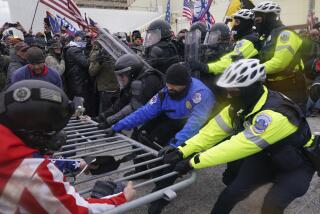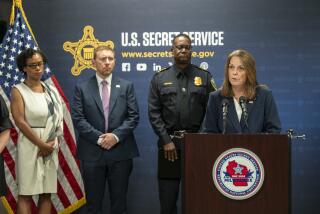Security to Be Tight at Fete for Constitution
- Share via
PHILADELPHIA — Protesters will be kept out of sight and security will be strict today as more than 200 members of Congress celebrate the bicentennial of the U.S. Constitution.
Ceremonies are scheduled throughout the afternoon at Independence National Historical Park, which marks the setting where 55 delegates drafted the Constitution during the summer of 1787.
In one ceremony, 55 delegates--one House member or senator from each state and the leadership from both chambers--will gather in the Assembly Room of Independence Hall to pay tribute to the Great Compromise of July 16, 1787. That decision, also called the Connecticut Compromise, created a Congress of two separate chambers.
The events are less grandiose than the bicentennial planning group We the People 200 had envisioned. Original plans called for the entire Congress to convene in Philadelphia.
We the People Chairman Willard G. Rouse III and others lobbied the leadership to organize the ceremonial gathering of 55 members. As the event neared, about 190 congressmen and 30 senators signed up for the trip. Many are bringing their families for a stay through Sunday billed as a “Philadelphia: Get To Know Us Weekend.”
As many as 600 U.S. Capitol Police, National Park Service rangers and Philadelphia police will be on hand to provide security, according to Chief Ranger Robert Byrne.
Authorities have ordered all windows facing the mall to be shut throughout the afternoon, and police sharpshooters will line rooftops. Metal detectors will screen everyone entering Independence Mall.
Most events will be closed to the public except for a half-hour welcoming ceremony at 2 p.m. The Great Compromise ceremony will be televised on giant screens on the mall.
The Philadelphia Gay and Lesbian Task Force planned a rally during the dinner. A ruling Tuesday barred plans to march within eyesight of the members of Congress.
“If we can’t tolerate a group that has a grievance that is very important--if they can’t be visible--the state of the First Amendment is very sad indeed,” said the task force’s attorney, David Kairys, during a hearing.
Joan Garner, deputy chief of civil litigation for the U.S. Attorney’s Office, said there is “no constitutional right to visibility.”
U.S. District Judge John Fullam ruled the demonstrators had a right to “proximity,” but not in “the immediate presence of a session of Congress.”
More to Read
Sign up for Essential California
The most important California stories and recommendations in your inbox every morning.
You may occasionally receive promotional content from the Los Angeles Times.













